

Apache module mod_fastcgi. This 3rd party module provides support for the FastCGI protocol.
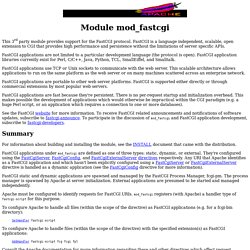
FastCGI is a language independent, scalable, open extension to CGI that provides high performance and persistence without the limitations of server specific APIs. FastCGI applications are not limited to a particular development language (the protocol is open). FastCGI application libraries currently exist for Perl, C/C++, Java, Python, TCL, SmallEiffel, and Smalltalk. FastCGI applications use TCP or Unix sockets to communicate with the web server. This scalable architecture allows applications to run on the same platform as the web server or on many machines scattered across an enterprise network. Running mod_fastcgi and PHP-FPM on Debian 7 (Wheezy) with Apache. Contributed by Jesin A Updated by Dave Russell Jr This is a Linode Community guide.
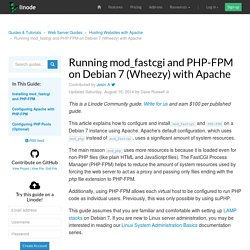
Write for us and earn $100 per published guide. Configuration. With FPM you can run several pools of processes with different setting.
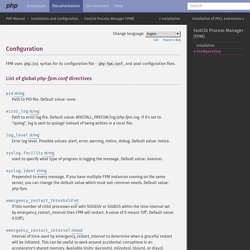
These are settings that can be tweaked per pool. listen string. Home - PHP-FPM. PHP-FPM - Httpd Wiki. With the release of apache httpd 2.4 upon an unsuspecting populace, we have gained some very neat functionality regarding apache and php: the ability to run PHP as a fastCGI process server, and address that fastCGI server directly from within apache, via a dedicated proxy module (mod_proxy_fcgi.) starting from release 5.3.3 in early 2010, PHP has merged the php-fpm fastCGI process manager into its codebase, and it is now (as of 5.4.1) quite stable. php-fpm was previously found at This means that we can now run secure, fast, and dependable PHP code using only the stock apache httpd and php.net releases; no more messing around with suphp or suexec - or, indeed, mod_php.
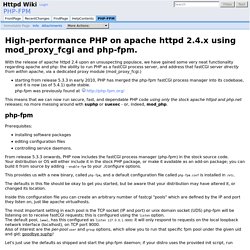
Quick Setup: Apache Worker, FastCGI, PHP-FPM and APC. I'm not going to go into great depths in this post, I'm mainly going to go through setting up Apache MPM Worker, PHP-FPM, FastCGI (mod_fastcgi, not mod_fcgid) and APC with an almost minimal configuration.
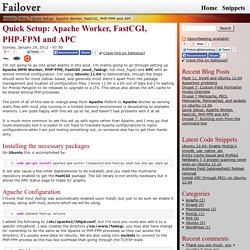
I'm using Ubuntu 11.04 to demonstrate, though the steps should work for most Debian based, and generally most distro's apart from the package management and location of configuration files. I know 11.04 is a bit out of date but I'm waiting for Precise Pangolin to be released to upgrade to a LTS. This setup also allows the APC cache to be shared among PHP processes. The point of all of this was to change away from Apache Prefork to Apache Worker as serving static files with mod_php running in a limited memory environment is devastating to available memory. I am quite happy with this set up so far, and haven't had problems with it at all. Installing the necessary packages. Setting up Apache with PHP-FPM. Nowadays nginx seems to experience a serious growth in terms of numbers when looking at HTTP server software.
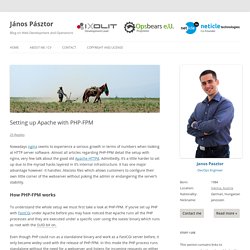
Almost all articles regarding PHP-FPM detail the setup with nginx, very few talk about the good old Apache HTTPd. Admittedly, it’s a little harder to set up due to the myriad hacks layered in it’s internal infrastructure. It has one major advantage however: it handles .htaccess files which allows customers to configure their own little corner of the webserver without poking the admin or endangering the server’s stability. Apache module mod_fastcgi. This 3rd party module provides support for the FastCGI protocol.
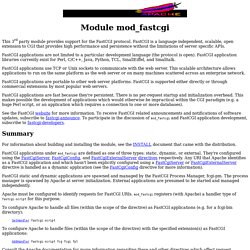
FastCGI is a language independent, scalable, open extension to CGI that provides high performance and persistence without the limitations of server specific APIs. FastCGI applications are not limited to a particular development language (the protocol is open). FastCGI application libraries currently exist for Perl, C/C++, Java, Python, TCL, SmallEiffel, and Smalltalk. FastCGI applications use TCP or Unix sockets to communicate with the web server. This scalable architecture allows applications to run on the same platform as the web server or on many machines scattered across an enterprise network. Experimental: Aegir 2 on Ubuntu 12.04 with apache, php-fpm. These notes describe a possible way of installing Apache with fastcgi using php5-fpm.
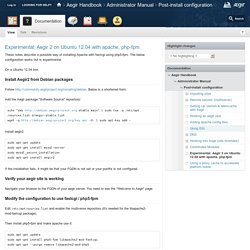
The below configuration works but is experimental. On a Ubuntu 12.04 box: Install Aegir2 from Debian packages Follow Below is a shortened form. Add the Aegir package "Software Source" repository: Install aegir2: sudo apt-get updatesudo apt-get install mysql-serversudo mysql_secure_installationsudo apt-get install aegir2 If the installation fails, it might be that your FQDN is not set or your postfix is not configured. Verify your aegir site is working Navigate your browser to the FQDN of your aegir server. Install PHP-FPM on Debian — Biapy Help Desk. PHP-FPM is an greatly enhanced FastCGI mecanism for PHP.
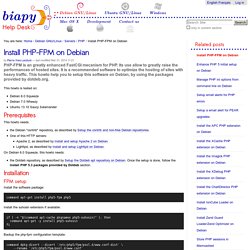
Its use allow to greatly raise the performances of hosted sites. It is a recommended software to optimize the hosting of sites with heavy traffic. This howto help you to setup this software on Debian, by using the packages provided by dotdeb.org.